IT Service Management: Ethical Analysis of Robotic Surgery and AI
VerifiedAdded on 2022/09/14
|5
|1264
|10
Discussion Board Post
AI Summary
This discussion post delves into the ethical complexities of robotic surgery, examining it through the lenses of utilitarianism, deontology, character-based ethics, and social contract theory. The post explores the potential risks and benefits of robotic surgery, including the accuracy of robots programmed by IT professionals, and the ethical responsibilities associated with their development and implementation. It critiques the use of robotic surgery, highlighting the potential for errors and the need for careful consideration of its impact on patient safety and societal well-being. The author uses ethical theories to argue that robotic surgery is prone to risks and may not be for the betterment of society. The author emphasizes that IT professionals are responsible for the accuracy of the robots they program and must act with virtue and morality to ensure patient safety. The post also references several academic sources to support its arguments.
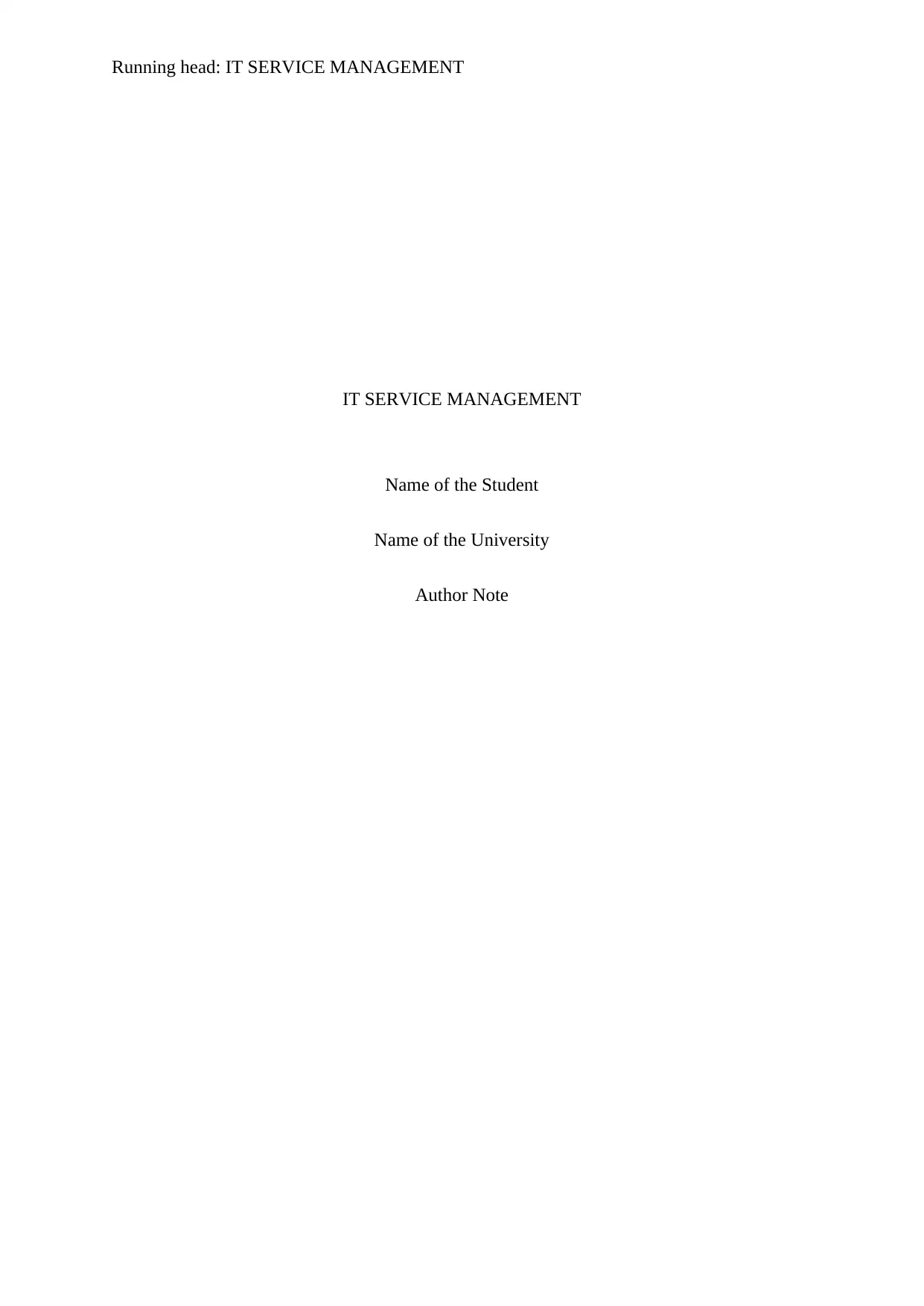
Running head: IT SERVICE MANAGEMENT
IT SERVICE MANAGEMENT
Name of the Student
Name of the University
Author Note
IT SERVICE MANAGEMENT
Name of the Student
Name of the University
Author Note
Paraphrase This Document
Need a fresh take? Get an instant paraphrase of this document with our AI Paraphraser
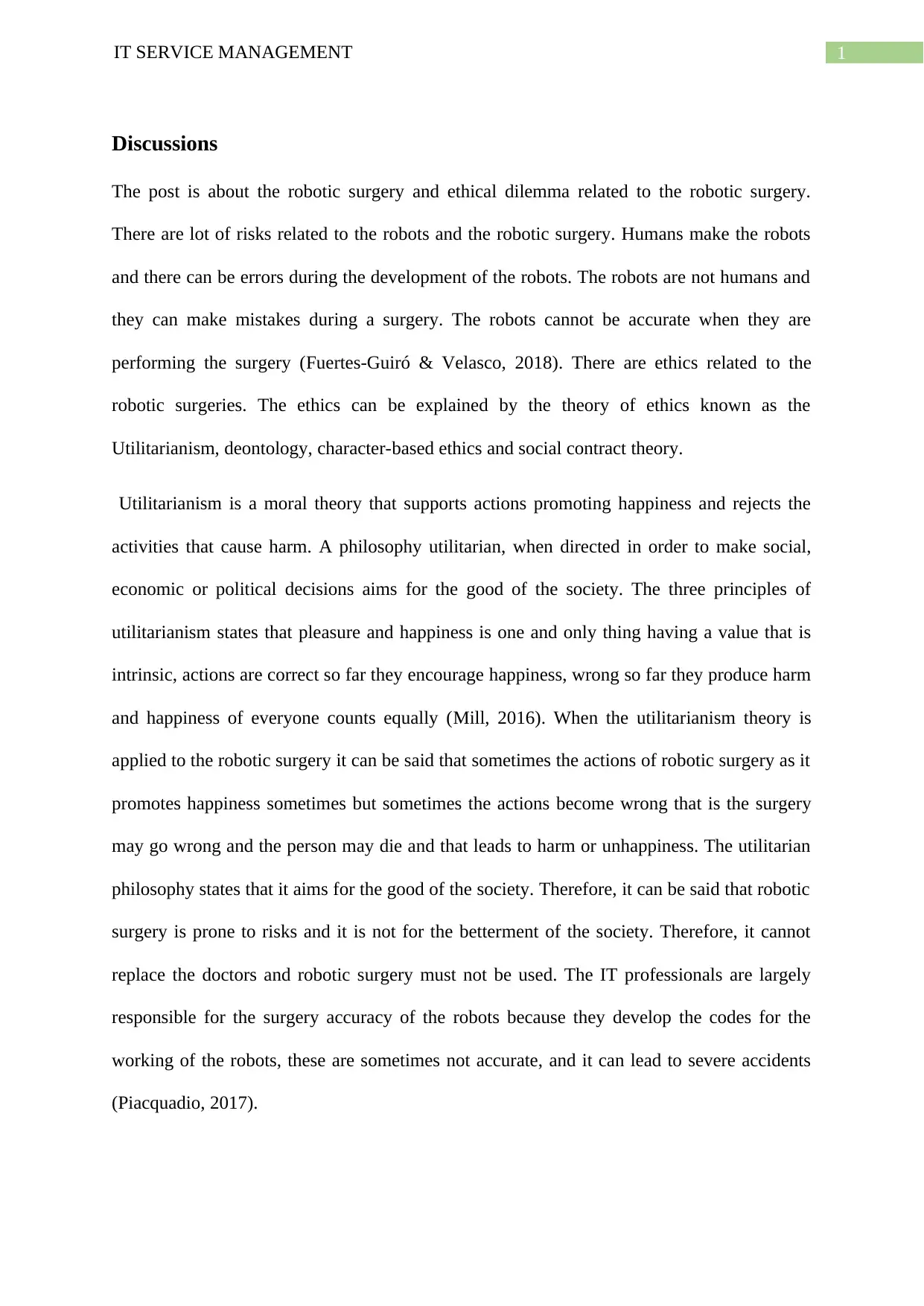
1IT SERVICE MANAGEMENT
Discussions
The post is about the robotic surgery and ethical dilemma related to the robotic surgery.
There are lot of risks related to the robots and the robotic surgery. Humans make the robots
and there can be errors during the development of the robots. The robots are not humans and
they can make mistakes during a surgery. The robots cannot be accurate when they are
performing the surgery (Fuertes-Guiró & Velasco, 2018). There are ethics related to the
robotic surgeries. The ethics can be explained by the theory of ethics known as the
Utilitarianism, deontology, character-based ethics and social contract theory.
Utilitarianism is a moral theory that supports actions promoting happiness and rejects the
activities that cause harm. A philosophy utilitarian, when directed in order to make social,
economic or political decisions aims for the good of the society. The three principles of
utilitarianism states that pleasure and happiness is one and only thing having a value that is
intrinsic, actions are correct so far they encourage happiness, wrong so far they produce harm
and happiness of everyone counts equally (Mill, 2016). When the utilitarianism theory is
applied to the robotic surgery it can be said that sometimes the actions of robotic surgery as it
promotes happiness sometimes but sometimes the actions become wrong that is the surgery
may go wrong and the person may die and that leads to harm or unhappiness. The utilitarian
philosophy states that it aims for the good of the society. Therefore, it can be said that robotic
surgery is prone to risks and it is not for the betterment of the society. Therefore, it cannot
replace the doctors and robotic surgery must not be used. The IT professionals are largely
responsible for the surgery accuracy of the robots because they develop the codes for the
working of the robots, these are sometimes not accurate, and it can lead to severe accidents
(Piacquadio, 2017).
Discussions
The post is about the robotic surgery and ethical dilemma related to the robotic surgery.
There are lot of risks related to the robots and the robotic surgery. Humans make the robots
and there can be errors during the development of the robots. The robots are not humans and
they can make mistakes during a surgery. The robots cannot be accurate when they are
performing the surgery (Fuertes-Guiró & Velasco, 2018). There are ethics related to the
robotic surgeries. The ethics can be explained by the theory of ethics known as the
Utilitarianism, deontology, character-based ethics and social contract theory.
Utilitarianism is a moral theory that supports actions promoting happiness and rejects the
activities that cause harm. A philosophy utilitarian, when directed in order to make social,
economic or political decisions aims for the good of the society. The three principles of
utilitarianism states that pleasure and happiness is one and only thing having a value that is
intrinsic, actions are correct so far they encourage happiness, wrong so far they produce harm
and happiness of everyone counts equally (Mill, 2016). When the utilitarianism theory is
applied to the robotic surgery it can be said that sometimes the actions of robotic surgery as it
promotes happiness sometimes but sometimes the actions become wrong that is the surgery
may go wrong and the person may die and that leads to harm or unhappiness. The utilitarian
philosophy states that it aims for the good of the society. Therefore, it can be said that robotic
surgery is prone to risks and it is not for the betterment of the society. Therefore, it cannot
replace the doctors and robotic surgery must not be used. The IT professionals are largely
responsible for the surgery accuracy of the robots because they develop the codes for the
working of the robots, these are sometimes not accurate, and it can lead to severe accidents
(Piacquadio, 2017).
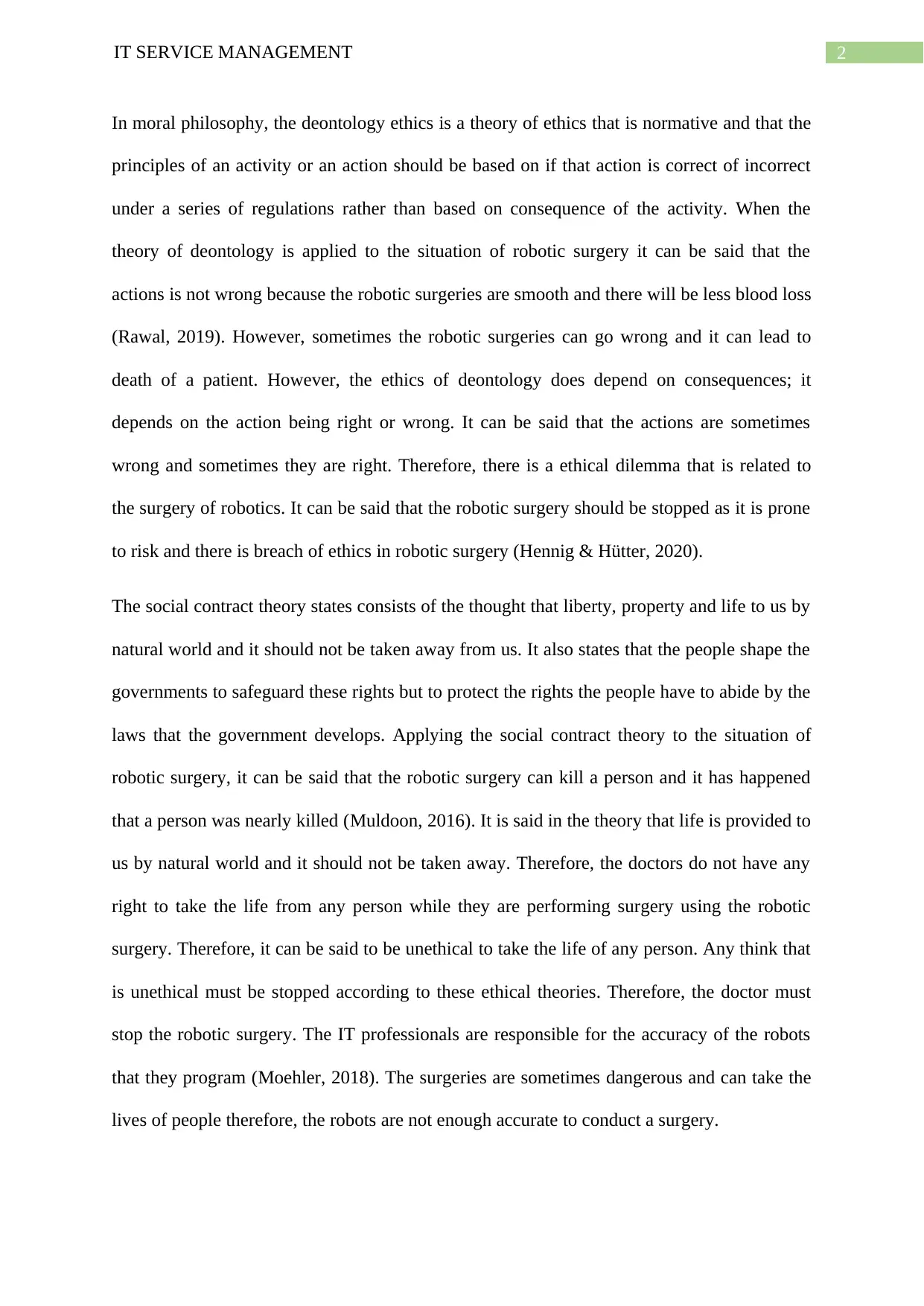
2IT SERVICE MANAGEMENT
In moral philosophy, the deontology ethics is a theory of ethics that is normative and that the
principles of an activity or an action should be based on if that action is correct of incorrect
under a series of regulations rather than based on consequence of the activity. When the
theory of deontology is applied to the situation of robotic surgery it can be said that the
actions is not wrong because the robotic surgeries are smooth and there will be less blood loss
(Rawal, 2019). However, sometimes the robotic surgeries can go wrong and it can lead to
death of a patient. However, the ethics of deontology does depend on consequences; it
depends on the action being right or wrong. It can be said that the actions are sometimes
wrong and sometimes they are right. Therefore, there is a ethical dilemma that is related to
the surgery of robotics. It can be said that the robotic surgery should be stopped as it is prone
to risk and there is breach of ethics in robotic surgery (Hennig & Hütter, 2020).
The social contract theory states consists of the thought that liberty, property and life to us by
natural world and it should not be taken away from us. It also states that the people shape the
governments to safeguard these rights but to protect the rights the people have to abide by the
laws that the government develops. Applying the social contract theory to the situation of
robotic surgery, it can be said that the robotic surgery can kill a person and it has happened
that a person was nearly killed (Muldoon, 2016). It is said in the theory that life is provided to
us by natural world and it should not be taken away. Therefore, the doctors do not have any
right to take the life from any person while they are performing surgery using the robotic
surgery. Therefore, it can be said to be unethical to take the life of any person. Any think that
is unethical must be stopped according to these ethical theories. Therefore, the doctor must
stop the robotic surgery. The IT professionals are responsible for the accuracy of the robots
that they program (Moehler, 2018). The surgeries are sometimes dangerous and can take the
lives of people therefore, the robots are not enough accurate to conduct a surgery.
In moral philosophy, the deontology ethics is a theory of ethics that is normative and that the
principles of an activity or an action should be based on if that action is correct of incorrect
under a series of regulations rather than based on consequence of the activity. When the
theory of deontology is applied to the situation of robotic surgery it can be said that the
actions is not wrong because the robotic surgeries are smooth and there will be less blood loss
(Rawal, 2019). However, sometimes the robotic surgeries can go wrong and it can lead to
death of a patient. However, the ethics of deontology does depend on consequences; it
depends on the action being right or wrong. It can be said that the actions are sometimes
wrong and sometimes they are right. Therefore, there is a ethical dilemma that is related to
the surgery of robotics. It can be said that the robotic surgery should be stopped as it is prone
to risk and there is breach of ethics in robotic surgery (Hennig & Hütter, 2020).
The social contract theory states consists of the thought that liberty, property and life to us by
natural world and it should not be taken away from us. It also states that the people shape the
governments to safeguard these rights but to protect the rights the people have to abide by the
laws that the government develops. Applying the social contract theory to the situation of
robotic surgery, it can be said that the robotic surgery can kill a person and it has happened
that a person was nearly killed (Muldoon, 2016). It is said in the theory that life is provided to
us by natural world and it should not be taken away. Therefore, the doctors do not have any
right to take the life from any person while they are performing surgery using the robotic
surgery. Therefore, it can be said to be unethical to take the life of any person. Any think that
is unethical must be stopped according to these ethical theories. Therefore, the doctor must
stop the robotic surgery. The IT professionals are responsible for the accuracy of the robots
that they program (Moehler, 2018). The surgeries are sometimes dangerous and can take the
lives of people therefore, the robots are not enough accurate to conduct a surgery.
⊘ This is a preview!⊘
Do you want full access?
Subscribe today to unlock all pages.

Trusted by 1+ million students worldwide
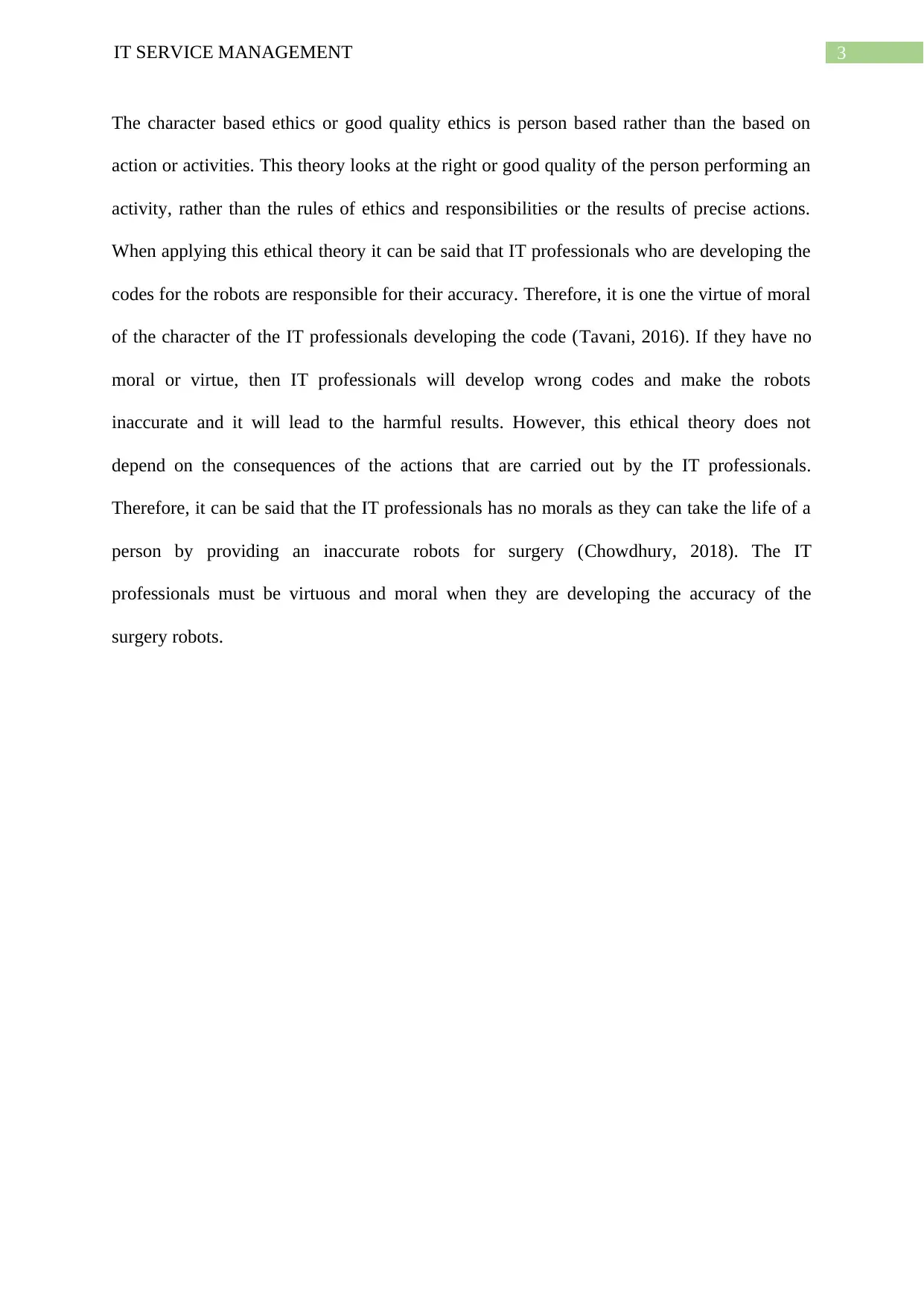
3IT SERVICE MANAGEMENT
The character based ethics or good quality ethics is person based rather than the based on
action or activities. This theory looks at the right or good quality of the person performing an
activity, rather than the rules of ethics and responsibilities or the results of precise actions.
When applying this ethical theory it can be said that IT professionals who are developing the
codes for the robots are responsible for their accuracy. Therefore, it is one the virtue of moral
of the character of the IT professionals developing the code (Tavani, 2016). If they have no
moral or virtue, then IT professionals will develop wrong codes and make the robots
inaccurate and it will lead to the harmful results. However, this ethical theory does not
depend on the consequences of the actions that are carried out by the IT professionals.
Therefore, it can be said that the IT professionals has no morals as they can take the life of a
person by providing an inaccurate robots for surgery (Chowdhury, 2018). The IT
professionals must be virtuous and moral when they are developing the accuracy of the
surgery robots.
The character based ethics or good quality ethics is person based rather than the based on
action or activities. This theory looks at the right or good quality of the person performing an
activity, rather than the rules of ethics and responsibilities or the results of precise actions.
When applying this ethical theory it can be said that IT professionals who are developing the
codes for the robots are responsible for their accuracy. Therefore, it is one the virtue of moral
of the character of the IT professionals developing the code (Tavani, 2016). If they have no
moral or virtue, then IT professionals will develop wrong codes and make the robots
inaccurate and it will lead to the harmful results. However, this ethical theory does not
depend on the consequences of the actions that are carried out by the IT professionals.
Therefore, it can be said that the IT professionals has no morals as they can take the life of a
person by providing an inaccurate robots for surgery (Chowdhury, 2018). The IT
professionals must be virtuous and moral when they are developing the accuracy of the
surgery robots.
Paraphrase This Document
Need a fresh take? Get an instant paraphrase of this document with our AI Paraphraser
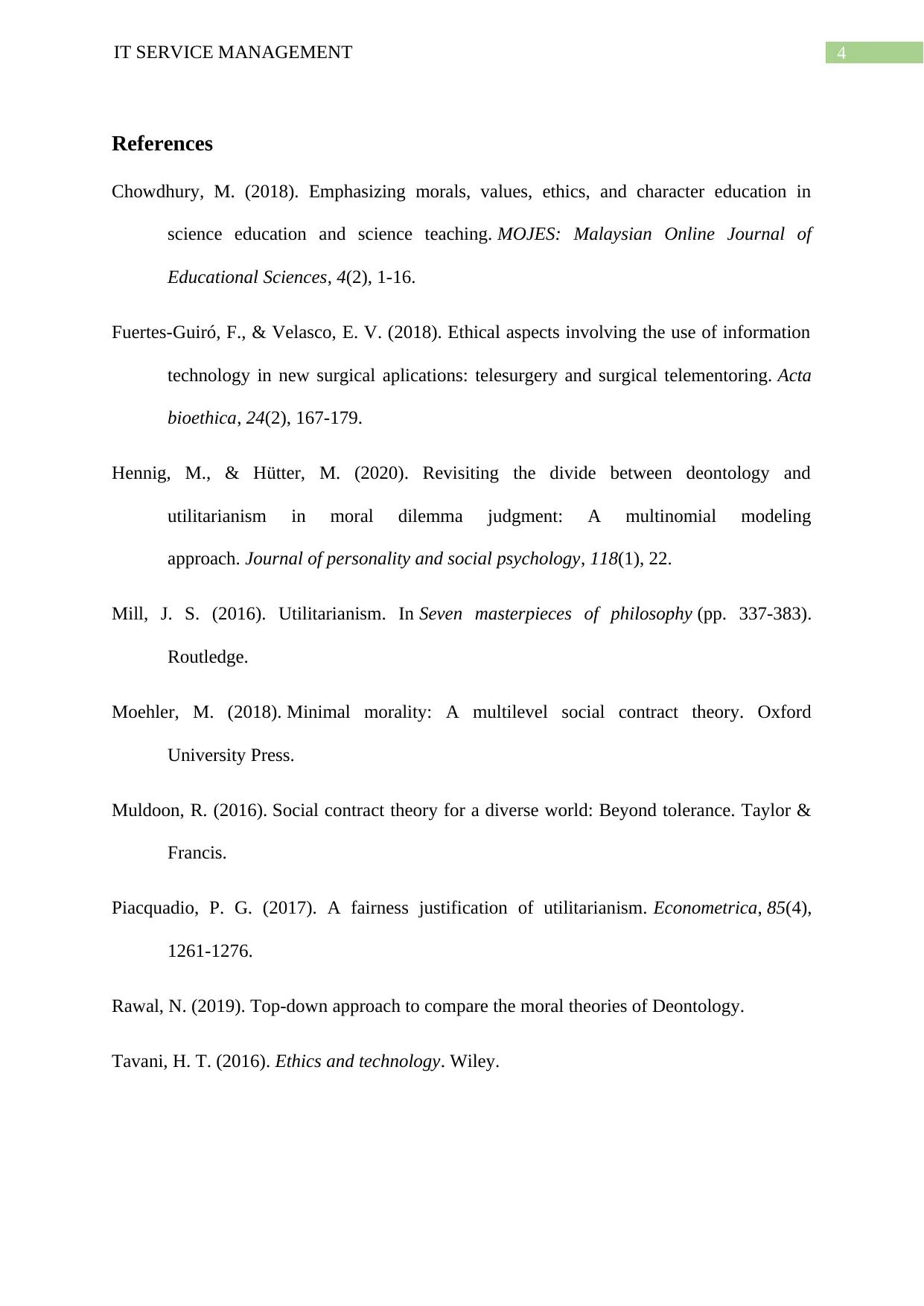
4IT SERVICE MANAGEMENT
References
Chowdhury, M. (2018). Emphasizing morals, values, ethics, and character education in
science education and science teaching. MOJES: Malaysian Online Journal of
Educational Sciences, 4(2), 1-16.
Fuertes-Guiró, F., & Velasco, E. V. (2018). Ethical aspects involving the use of information
technology in new surgical aplications: telesurgery and surgical telementoring. Acta
bioethica, 24(2), 167-179.
Hennig, M., & Hütter, M. (2020). Revisiting the divide between deontology and
utilitarianism in moral dilemma judgment: A multinomial modeling
approach. Journal of personality and social psychology, 118(1), 22.
Mill, J. S. (2016). Utilitarianism. In Seven masterpieces of philosophy (pp. 337-383).
Routledge.
Moehler, M. (2018). Minimal morality: A multilevel social contract theory. Oxford
University Press.
Muldoon, R. (2016). Social contract theory for a diverse world: Beyond tolerance. Taylor &
Francis.
Piacquadio, P. G. (2017). A fairness justification of utilitarianism. Econometrica, 85(4),
1261-1276.
Rawal, N. (2019). Top-down approach to compare the moral theories of Deontology.
Tavani, H. T. (2016). Ethics and technology. Wiley.
References
Chowdhury, M. (2018). Emphasizing morals, values, ethics, and character education in
science education and science teaching. MOJES: Malaysian Online Journal of
Educational Sciences, 4(2), 1-16.
Fuertes-Guiró, F., & Velasco, E. V. (2018). Ethical aspects involving the use of information
technology in new surgical aplications: telesurgery and surgical telementoring. Acta
bioethica, 24(2), 167-179.
Hennig, M., & Hütter, M. (2020). Revisiting the divide between deontology and
utilitarianism in moral dilemma judgment: A multinomial modeling
approach. Journal of personality and social psychology, 118(1), 22.
Mill, J. S. (2016). Utilitarianism. In Seven masterpieces of philosophy (pp. 337-383).
Routledge.
Moehler, M. (2018). Minimal morality: A multilevel social contract theory. Oxford
University Press.
Muldoon, R. (2016). Social contract theory for a diverse world: Beyond tolerance. Taylor &
Francis.
Piacquadio, P. G. (2017). A fairness justification of utilitarianism. Econometrica, 85(4),
1261-1276.
Rawal, N. (2019). Top-down approach to compare the moral theories of Deontology.
Tavani, H. T. (2016). Ethics and technology. Wiley.
1 out of 5
Related Documents
Your All-in-One AI-Powered Toolkit for Academic Success.
+13062052269
info@desklib.com
Available 24*7 on WhatsApp / Email
![[object Object]](/_next/static/media/star-bottom.7253800d.svg)
Unlock your academic potential
Copyright © 2020–2026 A2Z Services. All Rights Reserved. Developed and managed by ZUCOL.





